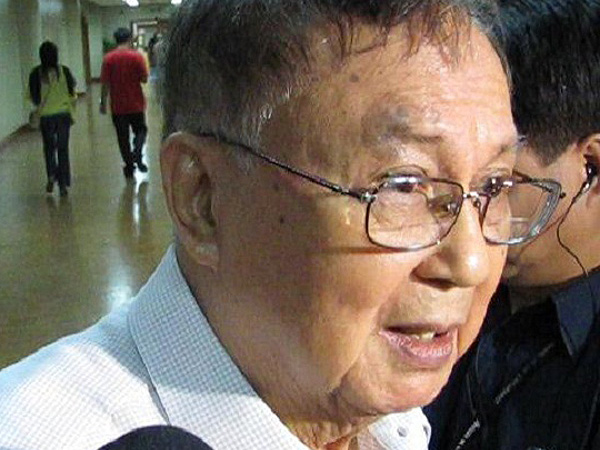Remembering Joker Arroyo
For the Filipinos who took down a president nearly 15 years ago, former senator Joker Arroyo would be remembered as the white-haired, impassioned prosecutor who fought a good fight, even when the battle already seemed lost.
In 2000, he led the 11-member prosecution panel during the impeachment trial of then President Joseph Estrada, who was ousted through Edsa People Power II in January 2001.
Arroyo said the impeachment courtroom drama that was beamed live to Filipinos nationwide from Dec. 7, 2000, to Jan. 16, 2001, showed just a fraction of the actual court work. “From the start, we made a statement that a legal battle is 80 to 90 percent preparation, and 10 to 20 percent court trial,” he said.
A human rights lawyer, Arroyo rose to national consciousness as the first lawyer who challenged before the Supreme Court the constitutionality of Proclamation No. 1081 imposing martial law by the late dictator Ferdinand Marcos.
He later joined other freedom lawyers in questioning before the high court the ratification of the Marcos-backed 1973 Constitution; Amendment 6 which vested law-making powers to Marcos alongside the Batasang Pambansa; and the power of military tribunals to try civilians.
Arroyo also helped defend some opposition leaders during the Marcos regime such as the late Sen. Benigno “Ninoy” Aquino Jr., the late Eugenio Lopez Jr., Communist Party of the Philippines founder Jose Ma. Sison, Sen. Sergio Osmeña III and former senators Jovito Salonga, Eva Estrada Kalaw and Nene Pimentel.
As a freedom fighter, Arroyo also had his share of physical and mental tortures during martial law, after he had been incarcerated in a military stockade, gassed, injured and hospitalized during protest rallies.
In 1980, he co-founded with fellow human rights lawyers the Movement of Attorneys for Brotherhood, Integrity and Nationalism Inc. (Mabini) and Free Legal Assistance Group (Flag).
During the snap elections in 1986, Arroyo served as counsel of Ninoy’s wife, the late President Corazon Aquino.
After the 1986 Edsa People Power, Arroyo became the executive secretary of the Aquino administration from 1986 to 1992 and chairman of the Philippine National Bank and executive director for the Philippines of the Asian Development Bank from 1986 to 1990.
Arroyo served three consecutive terms as representative of the 1st district of Makati City from 1992 to 1998 as an independent. He was the only congressman who had no bodyguards, no secretary and no media coordinators at that time.
Sometimes, it’s his driver who doubled as his secretary. Arroyo made his own appointments, carried his own leather attaché case and kept his own schedule. He also had that habit of mix-matching formal and casual wear, such as topping his blue denims with a white Barong Tagalog.
He was later elected senator and served two consecutive terms from 2001 to 2013. During his last term, he chaired the committees on accountability of public officers and investigations (blue ribbon), public services and justice and human rights.
In 2012, Arroyo was one of the three senators (the other two being Senators Ferdinand “Bongbong” Marcos Jr. and Miriam Defensor Santiago) who voted not guilty during the impeachment trial of ousted Chief Justice Renato Corona.
Among the citations he received were the Philippine Bar Association’s Most Distinguished Award for Justice and the Senate Resolution No. 100 enacted in the 8th Congress commending him for his invaluable services to the Filipino people.
Arroyo was born in Naga City on January 5, 1927. He finished his pre-Law at the Ateneo de Manila University and his Law degree at the University of the Philippines.
Sources: senate.gov.ph and Inquirer Archives
RELATED STORY
